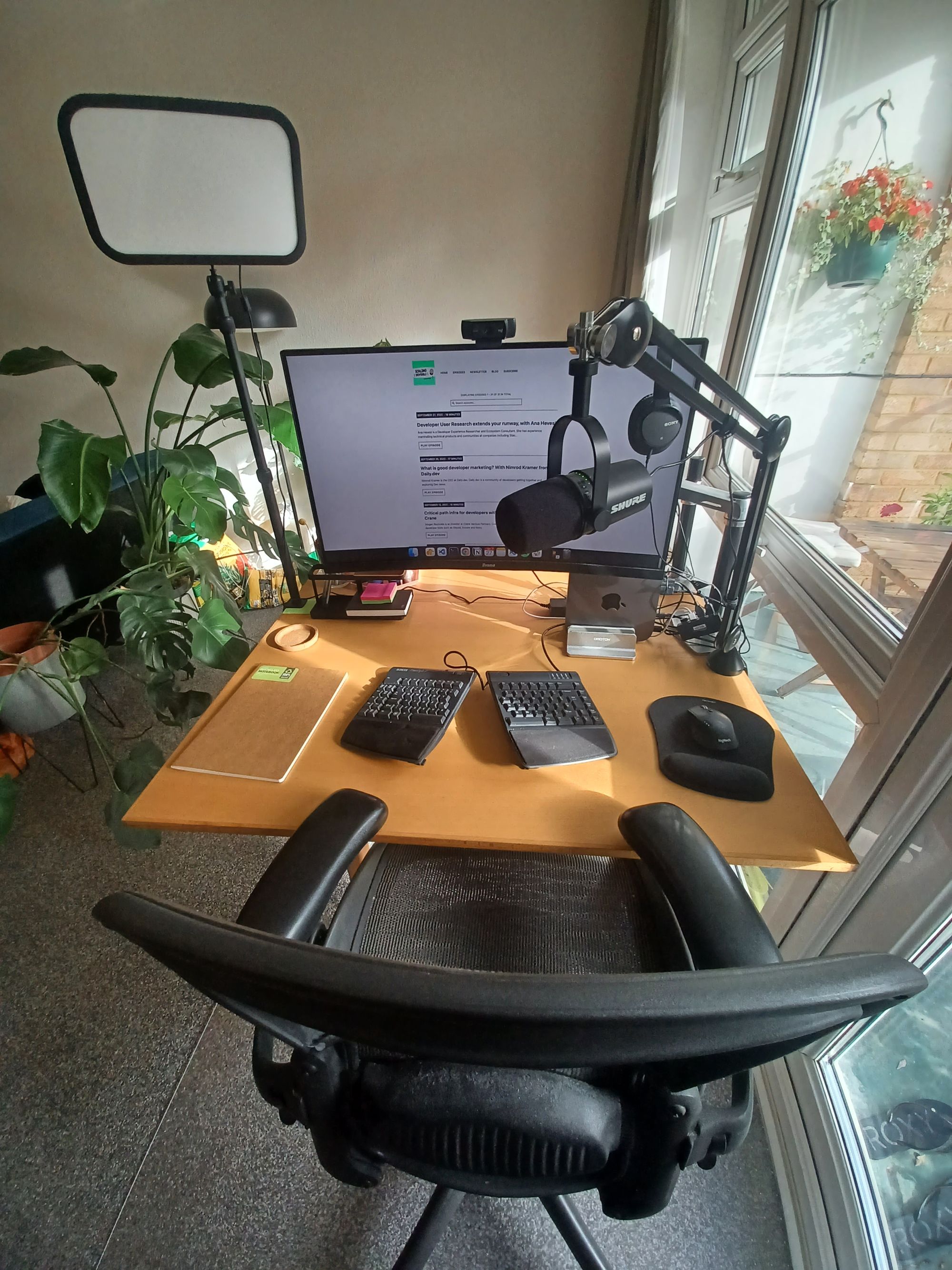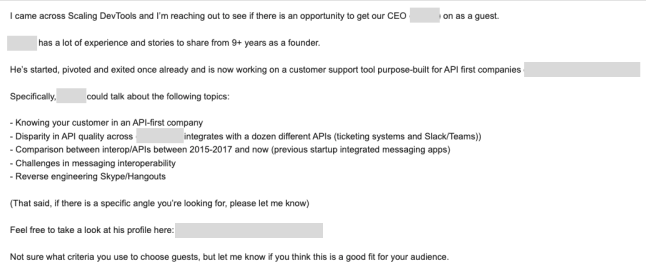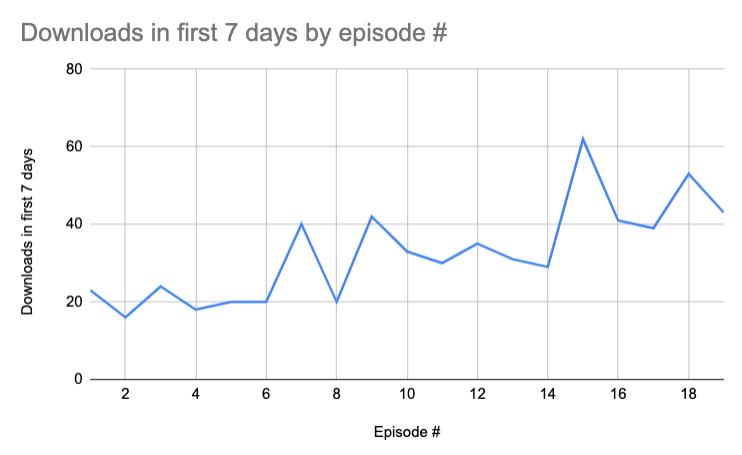Reflecting on 20 podcast episodes

It was an unremarkable April evening as I jogged through a nondescript suburban neighbourhood.
I was lost in thought. Nodding along to HAIM’s Women in Music Pt. III album.
The only sound to be heard was my pounding feet and the muffled sounds of the Californian sisters emanating from my Bose headphones.
Then suddenly. Whoosh!
As if from nowhere, a Zeus-looking figure holding a microphone shaped like a lightning bolt appeared above me.
Without a moment of hesitation, karaoke-Zeus javelin-ed the microphone-bolt straight down into my vocal cords.
I recoiled and fumbled at the microphone attempting to remove it.
But it was too late.
I'd been struck by an unquenchable urge to start a podcast.
I sent a panting voice note to the podcasting guru in my life, James McKinven.
Faster than you can say "brought to you by NordVPN", I'd agreed to start a podcast.
Fast forward five months.
I’ve now released 20 podcast episodes. I identify as a podcaster. People avoid me at parties.
I’ll try to recount everything I can remember and everything I see in my analytics.
I hope this helps others affected by this peculiar condition.
Pre-launch
James helped a lot at the beginning. I'm not sure I would have followed through without him and I referred constantly to his podcast course.
It’s definitely possible to do it without help or a course though.
Concept
Interview format to find out how developer tools grow, focusing on startups.
Why? Because I wanted to learn this. It's a podcast exactly for me.
Target audience
Founders of developer tools and early stage growth teams at developer tools.
Name
This was hard. Intelligent friends suggest I name it Developer Marketing Podcast to improve my search performance.
Maybe this would have been a good idea.
I did a Twitter poll which was inconclusive.
I wanted to be free to talk about anything to do with growth. So I just picked Scaling DevTools.
Trailer
So far, my trailer has had 40 downloads - it’s not a lot but I think still worth doing because it's helpful for potential listeners.
I followed roughly the below format:
- < 1 minute
- Introduce the show
- Examples of what kind of things will be on the show
- Who I am (the host) and why I care/know about this topic
- What they’ll get out of listening
Cover art
I don’t have much to say here because James handled it but I don’t think you need to overthink it. Here's mine. It's me in cartoon form.

Also, I posted a preview of the artwork on Twitter and it got a few likes.
A music track
Optional but it’s nice to have some music for your pod. I bought a licence for With the Winds on Premium Beats for $59. I picked it because it seemed upbeat but not annoyingly upbeat.
I did consider inquiring about HAIM's music but I'd probably be paying off the sisters for the rest of my life.
Equipment
Microphone - You definitely need a decent microphone.
Cut corners elsewhere but a microphone is definitely worth investing in if you can afford it. I got the Shure MV7 with USB for about £229 (~$245 USD)
Mic stand (optional) - I also bought the RØDE PSA1 Professional Studio Arm for £87 (~$93 USD)
Lighting (optional) - Later on, I bought a Godox light for £122 but that’s pretty unnecessary.
Camera (optional) If you’re recording video it could be nice to upgrade from your built-in Mac camera. I already had a Logitech C920 Pro webcam which I paid about $90 USD for.
For more info, James wrote a great post on microphones. And Don't Buy a Yeti.

First episode
Finding the first guest
I lucked out on the first episode and had already connected with Adam DuVander - the author of Developer Marketing Does Not Exist.
From that conversation, we set up a podcast recording.
I wanted the first episode to be a friend or at least someone confirmed as nice because I knew there was a high chance I’d mess up.
Adam was perfect!
Recording the first episode
It’s really nerve-racking recording for the first time and you might feel silly. My brain was saying “who do you think you are?!”
Then I remembered I was a on a mission from karaoke-Zeus and pushed through.
Partly because I didn’t think anyone - other than maybe a few friends - would listen.
By the way, hosting is hard!
Asking probing questions, responding intelligently and then linking to the next question ain't easy.
After an interesting response from a guest, my brain usually shuts down and the only words I can find are “that makes sense”.
James advised me to try to find the link while someone is speaking and I’ve tried to do this. But I’m still working on it.
Launching the first episode
I launched the episode on Twitter as well as a developer marketing slack.
The first episode of Scaling DevTools is live 🎙️🥳
— Jack Bridger (@jacksbridger) May 3, 2022
In under 20 minutes, @adamd gives some essential growth lessons for early-stage DevTools
Thanks to @jmckinven and @LydiaMelvinVA for your amazing work on this 🤟https://t.co/VqBuzSmhmu
I didn’t post on LinkedIn because I was too afraid my friends would tease me for starting a podcast.
Looking back it’s funny that I was completely fine spending $3,000 on a podcast that makes no money but utterly terrified of being called a wannabe influencer.
These days I do share on LinkedIn (more on that later).
The episode got 23 downloads in the first 7 days - a lot more than I was expecting.
The process of production
James helped me with the first episode but after that, I flew the nest and ventured out alone.
Here’s the process I use to make the content.
Production Software
- Riverside for recording($19 per month)
- Descript for editing ($12 per month)
Process
- Find guest/get referred/get messaged by guest
- Send a Calendly with booking slots of one hour. I limit it to days I’m not coding because it often gives me too much adrenaline to focus. The Calendly sends a link to the riverside studio.
- Usually in the call we prep 35 minutes, then record for 20 minutes and finally spend 5 minutes chatting. Sometimes I do a pre-call before this depending on the guest.
- Once a week my editor logs into Riverside and exports both person’s tracks including audio and video and brings them into the editing tool - Descript. She writes show notes as she goes. You can see examples in any of our episodes. We're also experimenting with using GPT-3 to summarise the transcript to make the show notes faster. It seems promising.
- Editor exports an mp3 of the whole track, video snippets for promotional stuff and a Transcript to upload
- I review everything and make changes if necessary.

Finding guests
Just like Oprah. For Scaling DevTools, finding good guests is the biggest factor for my show. Here’s what I look for:
- Interesting story or company worked for. I especially like guests from companies where I’ve used their products because I can ask better questions. Or I think the world really needs it.
- Written something interesting e.g. Wesley wrote some tweets I loved.
- Diversity of expertise and viewpoints - I love it when guests share completely new ideas about what we’ve already discussed on the podcast. I want to keep things interesting for me.
- Size of the relevant audience - I try not to let this be the main factor because it’s really hard to tell. But if, for example, someone gets a lot of interaction on tweets related to a topic, it’s probably going to be a highly downloaded episode.

- Indie Hackers community - I already knew Nico, Natwar, Michael & Phil from the Indie Hackers communities
- Developer marketing communities - Ronak, Dylan, Kuba, Julie, Karl
- Twitter interactions - Nimrod, Megan, Wesley, Juri, Ana
- For Richard, I asked Twitter who is an expert on developer video and Karl responded
- Referrals from other guests - Brandon, SJ,
- LinkedIn - Adam
- Work - Kimmy and I were working on something with iOS Dev Tools
Note: one week, I didn’t have a guest so I scraped the barrel and interviewed myself.
Messaging guests
I try to invite people who I’ve already been following for a while/
Here’s an example of a message I sent to Wesley Faulkner. I’d already fanboi-ed over Wesley’s tweets for a while so maybe that's why he didn't report me to Twitter.

P.s. highly recommend Wesley’s episode
Inbound guest requests
I have started to get semi-regular requests to be on the podcast. This is really cool and makes me feel better about my life choices.

So far I’ve not taken anyone up on it because I already had planned guests but it really helps and I would definitely book guests this way as it saves a lot of time.
Marketing
Podcast players (i.e. Spotify, Apple podcasts etc.)
Growing subscribers is hard and slow but it does seem to work because my listener numbers seem to grow - on average - over time.
I used Transistor to host and distribute my podcast on different platforms. It's been great.
This seems to be the biggest channel for new listeners. I post it on my personal Twitter and it usually gets some engagement from my ideal listeners.
I find it really difficult to analyse what does and doesn’t do well in the style of tweets. You can see for yourself here. If you have any advice, I'd love to hear.
I started sharing recently and I usually get a few likes. A lot of the likes are from supportive friends who definitely aren’t my target audience so I doubt it translates to downloads.
Slack Communities
I have shared my episodes in a few relevant slack communities but the Developer Marketing community has by far been the most supportive. Special shout out to Ronak & Kuba for sharing episodes.

Newsletter
I write a newsletter that currently has 55 subscribers. I share notes from episodes and some other developer marketing stuff I’ve seen. In my latest edition, I shared three episodes and below are the results:
- 61.2% open rate
- 14.5% click rate
- 23 clicks (2 of which were for podcast links)
I don’t think it’s a big driver of podcast downloads. But it does give me some oversight of who is interested in my work.
Blog posts
Something I want to get better with is turning podcasts into blogs.
I’ve tried:
- Hiring a writer to convert interviews into semi-related blog posts for my episodes with Brandon and Michael - I paid about $200 per blog post.
- I used GPT-3 to pull together a summary of my interview with Nimrod. I edited it pretty heavily but it helped with the first step.
YouTube
YouTube is really new to me. I don’t know why I didn’t upload there previously but I now have a channel.
Guests guide
Guests are the biggest driver of new listeners. I recently put together a guide for guests to encourage them to share the episode more widely on release.
Results
Downloads
The downloads are at ~1,100. August is probably an anomaly because Dylan’s episode was so popular and because we released five episodes compared to three in July and four in September.
Another fan theory is that I was bad at my job in September.
Overall it does seem to be growing.

Growth can be seen more clearly when looking at how each episode performs in the first 7 days.

Everything is release driven. I release episodes on Tuesday and you’ll see below that’s usually the spike and the downloads are clustered around Tuesdays with lower numbers at the weekends.

Where do people listen from?
No surprises in the top two - the U.S. of A is the biggest developer tools market and I'm from the land of bad weather, bad food and crooked teeth.
I’d have hoped India would be higher given the number of developer tools startups.
Not to self: interview more founders outside US and Western Europe.

Top episodes by downloads
Below are some numbers on my top three individual episodes. I’ve put some justification as to why they got more downloads than other episodes.
- Authentic Developer Education with Dylan Fox from AssemblyAI - 81 downloads

This episode is the most downloaded. I think it’s because AssemblyAI has a big brand itself and a great marketing team including Micky Teng who helped plan and promote the episode. We put a lot of work into coming up with the topics and I think it’s a good episode.
2. Solve problems - developer marketing with Julie Reboul
Julie is great and I think people around her think very highly of her so rushed to listen. I also featured this episode for a while because it got such positive feedback.

3. The four pillars of developer marketing with Kuba Czakon - 74 downloads
This episode is evergreen. Kuba has a lot of experience and has written extensively on developer marketing. Because of that, it’s a great episode.

By the way, some of my favourite episodes have lower numbers of downloads. It means I didn’t market them as well. Or they were early on, or very recent.
Some kind words I've seen
- “Huge fan of this pod! Yall should check it out!” - Justin Hilliard, cofounder of Superwall
- “Love your podcast dude. Been listening to them all. Favourite episodes: Kuba, Wesley, and SJ” - Harpreet Sahota, DevRel Manager at Deci AI
- “Hey Jack, I love your work on Scaling DevTools” - Megan Reynolds - DevTools investor at Crane
Business benefits
- I have received a few really helpful introductions from people like Karl Hughes.
- Nimrod (founder of Daily.dev) suggested he could help if I launch something
- A few other friends have mentioned that I could help them with dev tools marketing if I go that route.
Reputation benefits
It’s really hard to measure but I think there have been some reputation benefits. A few times when I spoke to someone new, they told me they'd listened to the podcast.
Costs
Startup costs - $784
- Mic - $245
- James’s help and guide - $350
- Music track - $59
- Lights - $130
Monthly ongoing costs - $450
- Editor - ~$400
- Video editing software - $12
- Video recording software - $19
- Website hosting & distribution - $19
Ad-hoc costs - $460
- One studio session - $60
- Two blog posts from episodes - $400
Total costs for 20 episodes - $3494.
Time/Opportunity cost
- Finding guests - 30 minutes
- Coordinating with guests - 30 minutes
- Reviewing/editing episodes - 2 hours
- Researching & interviewing guests - 2 hours
- Marketing posts 2/3 hours
Opportunity cost - roughly $500 per episode (compared to contracting as a developer)
Total opportunity cost - roughly 22 days or $11,000 including setup.
Lessons
In-person interviews are worth it now and then
I love real-life recordings. It’s more fun.
Plus the quality is so much better. Especially if your guests are otherwise recording with their laptop mic. You can hear the difference in this episode.
Also, this tweet from Megan got a lot of traction. I think partly because it looks like a real podcast.
On the Scaling DevTools pod this morning with MVP @jacksbridger talking OSS & building a dev-first GTM ✨thanks for a great convo! pic.twitter.com/EjmyQkts5w
— Megan Reynolds 👩💻 (@meganreyno) August 24, 2022
Things I got right:
- I made it fun. I don’t do interviews with guests I’m not interested in and I haven’t put too much pressure on myself to do 'well'.
- The podcast is very focused on the things I’m interested in. So some other people with similar interests seem to like it.
- TL;DR - happy with the quality.
Things I want to do better
- Turn every episode into a simple blog post using GPT-3 (plus a quick edit).
- Be more organised by asking guests to market in advance
- Make a checklist of places to share. Then share as-is or create specific pieces of content for each of these channels e.g. video clips, tweets etc. Inspired by swyx’s article here.
- TL;DR - do more marketing
Conclusion - is it worth it?
On paper, absolutely not
The total all-in cost of what I did has been about $14,500.
I’ve achieved a total of ~1,100 downloads.
If I were to put sponsors, I’m told a typical CPM is $25.
Even if I charged $100 CPM because it's a niche, it's still a staggeringly bad return on investment.
But it might grow
I am seeing some growth generally. Additionally, since most listeners are repeat listeners, hopefully, things will naturally grow over time. It's conventional wisdom that podcasts take a long time to compound.
And I've met some amazing people
Starting a podcast might be the biggest life hack around to meet great people doing cool things.
And I’m looking for business ideas
If it helps me find a business idea, or a cofounder or helps me with finding customers, that will be a huge benefit.
Will I continue?
Financially it's not worth it yet.
But I’m enjoying learning from my guests and the positive pieces of feedback have been great.
I hope also that whatever business I do end up building, the podcast will help.
So for now, I will continue because I think it's cool.
Put things out there that you think are cool
— Jack Bridger (@jacksbridger) July 29, 2022
Great advice from @natwar86
Full episode -> https://t.co/ZWXPbRC3PR pic.twitter.com/x57BZsE3DM